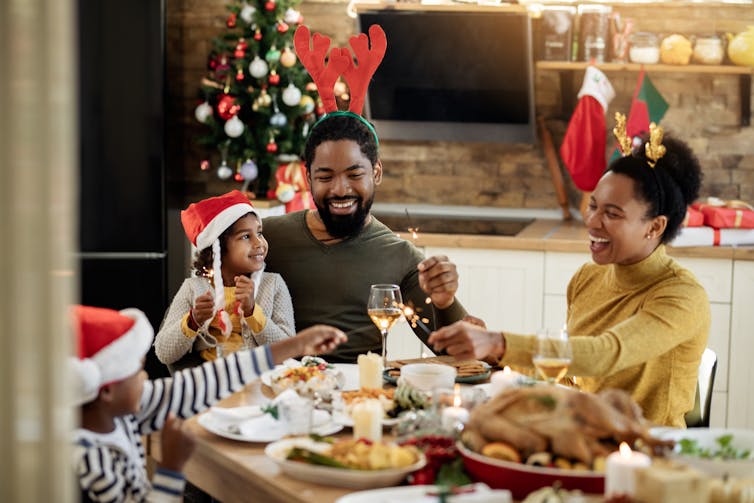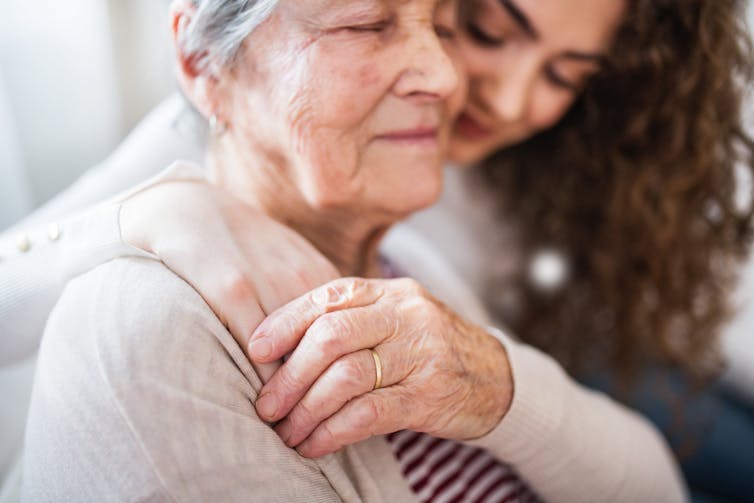There is no doubt that Christmas will be different this year. Lockdowns and distancing guidelines have already curtailed other celebrations, such as Eid and Diwali.
For Christmas, restrictions on social contact are being loosened in the UK. They allow three households to form a bubble for a five-day period. Nevertheless, many people who would normally gather at this time of year will no longer be able to meet.
This does not mean we should abandon our celebrations. Coming together, even remotely or in more intimate groups, allows us to engage in activities relevant to our shared identities. Taking part in shared family and national traditions, such as those practised during religious celebrations, boosts our sense of shared identity, connection, and ultimately wellbeing.
Emotional significance
Before the recent announcement of the relaxing of social distancing around Christmas Day, a survey by the Telegraph revealed that one in four of Britons taking part intended to ignore restrictions in order to celebrate Christmas with family and friends, regardless of the guidance.
These intentions – that appear to prioritise celebrating together above safety – reveal the emotional significance of this occasion for many people.
A growing body of evidence in social psychology has shown that social groups, such as families, friends, colleagues and communities, are essential for health and wellbeing. These groups are central to our sense of self. They provide us with valuable psychological resources, including feelings of belonging and acceptance. They help reduce experiences of stress and provide access to help and support.
Being denied access to these valuable groups at a time of stress places a great psychological burden on members of the public – especially those already experiencing vulnerability. It is perhaps unsurprising that there is a national longing to reconnect to these sources of strength and familiarity.
Shared traditions
As well as being good for us, social groups also help satisfy psychological needs. One of these is the need for continuity. Being part of a group can help with this because it allows people to feel part of something stable and predictable across time and history.
We create and continue the stories of our families, communities and nations by sharing and passing on group culture through shared narratives, treasured belongings, rituals, and traditions.

Religious holidays and celebrations remain at the heart of shared group traditions for many. Even in non-religious communities, events such as Christmas are valued, shaped and shared in families in their own unique ways.
Furthermore, global threats to existence such as the pandemic don’t just affect isolation and loneliness. They also remind us of our own vulnerability and create a sense of concern about our shared future: an experience psychologists call “collective angst”.
When faced with such threats, we seek to reaffirm our cultural, national and family identities and gain comfort from the expression of tradition and collective continuity. In particular, enacting these traditions can trigger shared experiences of nostalgia that make us feel connected and revitalised.
The UK government has recognised that spending time with loved ones may be even more important this year and the eased restrictions could allow families to come together again before the difficult winter ahead.
A smaller scale
The evidence does indeed suggest that being together to celebrate well-loved traditions like Christmas may affirm identity and boost wellbeing through these challenging times. However, it is possible to share and enjoy family traditions in smaller household groups.

Recent research suggests this might be a safer option, as being together in extended family groups can lead to increased risk. This is because we tend to feel less vulnerable around people we trust and sense a connection to – such as family members. This experience of connection can increase the likelihood of social contact behaviours that risk potential transmission.
As we move into this unusual festive season, it is encouraging to know that coming together on Skype or Zoom can effectively boost wellbeing just as meeting in person in does, by helping families and communities connect, communicate and support each other.
Those choosing a more restricted or remote festive season can find an abundance of suggestions available for adaptations to usual routines. In 2020, we may find school nativities and religious ceremonies are live-streamed, festive fairs may be replaced by walks to see displays of local Christmas lights, and the after-dinner board games may be temporarily replaced with the virtual family quiz.
So this year, while we strive to maintain the traditions and celebrations that bind us, we may need to think a little more creatively about ways to come together to share our traditional festivities and reap their psychological rewards.

